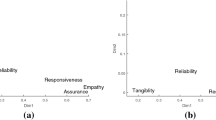Abstract
Importance weighting is a common practice in quality of life (QOL) measurement research. Based on the widespread idea that important domains should make a greater contribution to individuals’ QOL total score, the weighting procedure of multiplying item satisfaction by an item’s importance has been adopted in many QOL instruments. Locke’s [1969, Organizational Behavior and Human Performance 4, 309–336; 1976, Handbook of Industrial and Organizational Psychology. Rand McNally, Chicago, pp. 1297–1343] range-of-affect hypothesis indicated that a satisfaction evaluation is determined by the have-want discrepancy, importance, and the interaction of the have-want discrepancy and importance, implying that a satisfaction evaluation incorporates the judgment of importance and weighting the satisfaction score with the importance score is unnecessary. The purpose of the current study was to address the issue of importance weighting by examining Locke’s range-of-affect hypothesis in the context of QOL research. A within-subject experiment was conducted to see if, given a varying amount of discrepancy, participants would reveal whether or not satisfaction/dissatisfaction is related to the dimension of importance placed on the object. Forty undergraduate students at National Taiwan University participated in the current study. Results revealed that the association between have-want discrepancy and object satisfaction is stronger on the high important dimension than the less important dimension. Generally, the results were consistent with Locke’s range-of-affect hypothesis, revealing that a satisfaction evaluation has incorporated the judgment of item importance, suggesting that the procedure of importance weighting is unnecessary.
Similar content being viewed by others
References
Baron R. M. and Kenny D. A. (1986). The moderator-mediator variable distinction in social psychological research: Conceptual, strategic and statistical considerations. Journal of Personality and Social Psychology 51: 1173–1182
Cummins R. A. (1997). Comprehensive Quality of Life Scale – Adult: Manual. Deakin University, Australia
Dijkers M. P. (2003). Individualization in quality of life measurement: Instruments and approaches. Archives of Physical Medicine and Rehabilitation 84: S3–14
Ewen R. B. (1967). Weighting components of job satisfaction. Journal of Applied Psychology 51: 68–73
Ferrans C. and Powers M. (1985). Quality of life index: Development and psychometric properties. Advances in Nursing Science 8: 15–24
Frisch M. B. (1992). Use of the quality of life inventory in problem assessment and treatment planning for cognitive therapy of depression. In: Freeman, A. and Dattlio, F.M. (eds) Comprehensive Casebook of Cognitive Therapy, pp 27–52. (Plenum Press, New York)
Frisch M. B., Cornell J., Villanueva M. and Retzlaff P. J. (1992). Clinical validation of the quality of life inventory: A measure of life satisfaction for use in treatment planning and outcome assessment. Psychological Assessment 4: 92–101
Hsieh C. M. (2003). Counting importance: The case of life satisfaction and relative domain importance. Social Indicators Research 61: 227–240
Locke E. A. (1969). What is job satisfaction?. Organizational Behavior and Human Performance 4: 309–336
Locke E. A. (1976). The nature and causes of job satisfaction. In: Dunnette, M.D. (eds) Handbook of Industrial and Organizational Psychology, pp 1297–1343. (Rand McNally, Chicago)
McFarlin D. B., Coster E. A., Rice R. W. and Coopper-Alison T. (1995). Facet importance and job satisfaction: Another look at the range of affect hypothesis. Basic and Applied Social Psychology 16: 489–502
McFarlin D. B. and Rice R. W. (1992). The role of facet importance as a moderator in job satisfaction processes. Journal of Organizational Behavior 13: 41–54
Mikes P. S. and Hulin C. L. (1968). Use of importance as weighting component of job satisfaction. Journal of Applied Psychology 52: 394–398
Mobley W. H. and Locke E. A. (1970). The relationship of value importance to satisfaction. Organisational Behavior and Human Performance 5: 463–483
Raphael D., Rukholm E., Brown I., Hill-Bailey P. and Donato E. (1996). The Quality Of Life Profile-Adolescent Version: Background, description, and initial validation. Journal of Adolescent Health 19: 366–375
Rice R. W., Gentile D. A. and McFarlin D. B. (1991a). Facet importance and job satisfaction. Journal of Applied Psychology 76: 31–39
Rice R. W., Markus K., Moyer R. P. and McFarlin D. B. (1991b). Facet importance and job satisfaction: Two experimental tests of Locke’s range of affect hypothesis. Journal of Applied Social Psychology 21: 1977–1987
Staples D. S. and Higgins C. A. (1998). A study of the impact of factor importance weightings on job satisfaction measures. Journal of Business and Psychology 13: 211–232
Waters L. K. (1969). The utility of importance weights in predicting overall job satisfaction and dissatisfaction. Educational and Psychological Measurement 29: 519–522
Waters L. K. and Roach D. (1971). Comparison of unweighted and importance-weighted job satisfaction measures for three samples of female office workers. Psychological Reports 28: 779–782
Wu, C. H. and Yao G. (in press a) Do we need to weight item satisfaction by item importance? A perspective from Locke’s range-of-affect hypothesis. Social Indicators Research
Wu, C. H. and Yao G. (in press b) Do we need to weight satisfaction scores with importance ratings in measuring quality of life? Social Indicators Research
Author information
Authors and Affiliations
Corresponding author
Additional information
This paper was a part of the first author’s Master’s Thesis.
Rights and permissions
About this article
Cite this article
Wu, Ch., Yao, G. Importance has been Considered in Satisfaction Evaluation: an Experimental Examination of Locke’s Range-of-affect Hypothesis. Soc Indic Res 81, 521–541 (2007). https://doi.org/10.1007/s11205-006-0021-z
Accepted:
Published:
Issue Date:
DOI: https://doi.org/10.1007/s11205-006-0021-z




